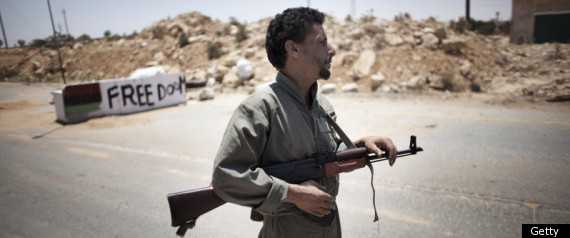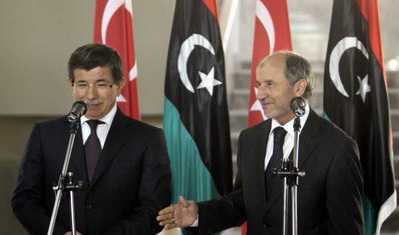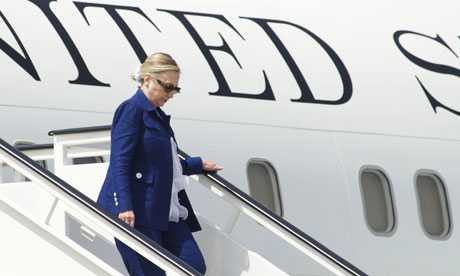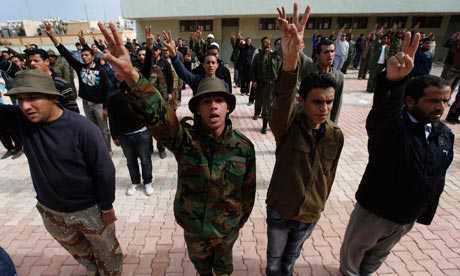ISTANBUL — The United States and more than 30 other nations on Friday formally recognized Libya’s main opposition group as the country’s legitimate government, giving the rebel movement a major boost.
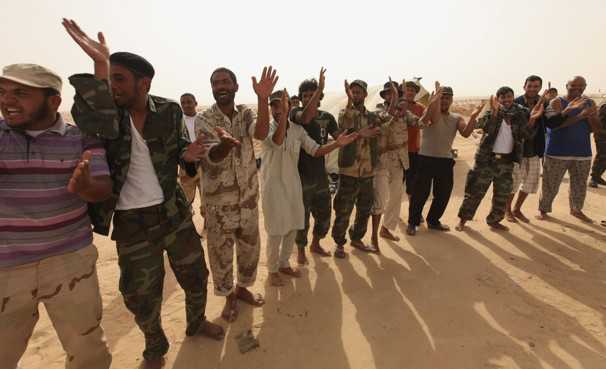
The decision, which declared Libyan leader Moammar Gadhafi’s regime no longer legitimate, gives his foes greater credibility and will potentially free up billions in cash that the rebels fighting Libyan forces urgently need.
The front lines in the Libyan civil war have largely stagnated since the popular uprising seeking to oust Gadhafi broke out in February. Rebels, backed by NATO’s air force bombings, control much of the country’s east and pockets in the west. But Gadhafi controls the rest from his stronghold in Tripoli, the capital.
Foreign ministers and other representatives of the so-called Contact Group on Libya said in a statement Friday that the “Gadhafi regime no longer has any legitimate authority in Libya.” They said the Libyan strongman and certain members of his family must go.
“The Contact Group has sent an unequivocal message to Gadhafi: that he has no legitimacy and there is no future for Libya with him in power. He must go and go now,” said British Foreign Secretary William Hague.
The nations said they would deal with Libya’s main opposition group — the National Transitional Council, or NTC — as “the legitimate governing authority in Libya” until an interim authority is in place that will organize free and fair elections.
In addition to the U.S., the 32-nation Contact Group on Libya includes members of NATO, the European Union and the Arab League.
Diplomatic recognition of the foes of Gadafi means that the U.S. will soon be able to fund the opposition with some of the more than $30 billion in Gahdafi-regime assets that are frozen in American banks. Other countries holding billions more in such assets will be able to do the same.
Contact Group representatives broke into spontaneous applause when U.S. Secretary of State Hillary Rodham Clinton announced her nation’s recognition of the NTC, according to U.S. officials.
Rebel spokesman Mahmoud Shammam welcomed the NTC’s recognition and called on other nations to deliver on a promise to release hundreds of millions of dollars in funds to the opposition. “Funds, funds, funds,” Shammam said, in order to stress the opposition’s demand. It remained unclear Friday whether the unfrozen assets could be used to purchase arms, or if some restrictions would still apply.
Meanwhile, the council’s oil minister said Libya could be exporting 1 million barrels of oil a day within three to four months of Gadhafi’s departure. He said the opposition hopes to hold elections within a year and resume oil exports very soon, saying the damage to oil facilities has been minimal and repaired.
There had been concerns about whether the initial replacement government would represent the full spectrum of Libyan society.
Human Rights Watch urged the Contact Group to press the council to ensure that civilians are protected in areas where rebels have assumed control. It cited abuses in four towns — Awaniya, Rayayinah, Zawiyat al-Bagul, and Qawalish — recently captured by rebels in the western mountains, including looting, arson and beatings of some civilians who remained when government forces withdrew.
In June, the group criticized the rebels for arbitrarily detaining dozens of men suspected of supporting Gadhafi.
Early on, some in the West feared the rebels contained radical Islamist elements. While a number of individual fighters have been found to have old connections to radical groups, none of them have risen in the rebel leadership, which insists it seeks to establish a democratic government based on a secular constitution.
Clinton said the council won international recognition after giving assurances it would respect human rights and presenting a plan on how to pave the way to a truly democratic Libyan government.
She said the assurances included upholding the group’s international obligations, pursuing a democratic reform process that is both geographically and politically inclusive, and dispersing funds for the benefit of the Libyan people.
“We believe them, we think that’s what they intend to do,” Clinton said.
The U.S and others were impressed by the progress the NTC has made in laying the groundwork for a successful transition to a Libya that protects the rights of all its citizens, including women and minority groups, diplomats said.
Asked why it took so long to recognize the NTC, Clinton said the U.S. administration analyzed the situation to make sure that the NTC’s actions are in accord with its statements.
“We really have acted in warp time in diplomatic terms, but we took our time to make sure that we were doing so based on our best possible assessments,” Clinton said.
Ahead of the meeting in Istanbul, a spokesman for the Gadhafi government said its members were ready to die in defense of the country’s oil against attacks by the rebels and NATO forces. “We will kill, we will die for oil,” Moussa Ibrahim said. “Rebels, NATO, we don’t care. We will defend our oil to the last drop of blood and we are going to use everything.”
The Contact Group statement called for the establishment of a cease-fire and the provision of humanitarian assistance to “normalize life.” It also urged a smooth transition to democracy, ruled out participation of “perpetrators of atrocities against civilians” in a future political settlement, and called on members to provide financial aid to the opposition, including the unfreezing of Libyan assets and helping the opposition to resume the production and export of oil.
U.S. officials said more work needs to be done to fully legalize that step under current U.N. sanctions on Libya.
The recognition does not mean that the U.S. diplomatic mission in the rebel-held city of Benghazi, Libya, is now an embassy. Titles of staff and names of offices will be decided in the coming days, the officials said. Other countries may move more quickly, they said.
Meanwhile, Gadhafi has been urging his loyalists to take up arms to attack Libya’s enemies. In an audio broadcast to thousands of supporters in the town of Zlitan on Friday, Gadhafi defiantly addressed the Contact Group:
“You guys say that Gadhafi is over,” he said. “Then why are all these people demonstrating outside?”
___
Associated Press writers Suzan Fraser in Ankara and Ben Hubbard in Cairo contributed to this report.



